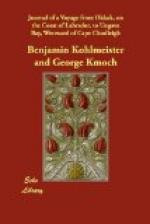3d. At dawn of day, and being still four miles distant from Nachvak, we perceived both in the open sea, and all along the shore, that our passage was completely occupied with floating ice, which drove towards us, and forced us back. We then endeavoured to find shelter in a bay bounded by high mountains, but found none, the wind driving the ice after us into it, and soon filling it. Jonathan frequently cried out with a plaintive voice: “Alas, alas, we shall soon be without a boat!” We now hastened to the opposite shore to find some cove or inlet, but getting more and more entangled among the ice, were at last obliged, some to land, and haul the boat with ropes round the points, and others with boat-hooks and spars, to keep her off the rocks. Two or three times she stuck fast on sunken rocks, but by God’s mercy always got off again without damage. At length we discovered three narrow inlets, the middlemost forming a bay, being the estuary of a river, which runs W.S.W. about eight or ten miles up the country, and is called Nullatartok. Into this we pushed, when shortly after our entrance, the ice entirely filled up the passage, and we were compelled to retreat to the uppermost part, choosing the shallowest possible spot to anchor in. The bay itself is about two miles in breadth, and only in the middle deep enough to admit the larger fields of drift ice to float into it. The strand is broad, and slopes off gently. It is covered with large tables of slate. The mountains on each side are high, and seem to consist of ferruginous slate, the lamina or plates of which are of such immense size, that they might serve for entire walls. Towards the sea, there exudes from these rocks, a yellowish white substance, which has a strong sulphureous smell. It was so powerful, that if a drop fell on a piece of tinned iron, it removed the tin in a few minutes.
The vallies in the neighbourhood were green and full of flowers.
Not far from the spot where we had pitched our tents, (which rested upon a carpet of potentilla aurea, in full bloom, bringing to our minds the European meadows, full of butter-cups), the river, which is of considerable breadth, falls into the bay. It abounds with fine salmon-trout. Farther to the westward, two other rivers flow into it, one of which is much broader than the other, and has a large cataract at some distance from its mouth. The upper parts of the mountains are covered partly with moss, and partly with low brush-wood, birch, and alder, and many berry-bearing shrubs and plants, but no high trees. We found here both arnica and colts-foot in great plenty. Brother Kohlmeister gathered and dried a quantity of each, as they are used in medical cases, and the former cannot be procured from England.




